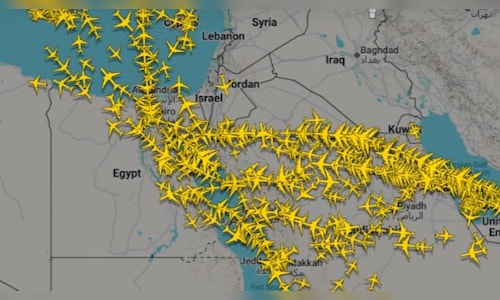IndiGo issued an advisory on Saturday (June 14), indicating that rerouting was essential due to ongoing restrictions in Middle Eastern/West Asia airspace. In a statement on X, the airline remarked, “Airspace over Iran and surrounding areas continues to be unavailable. Certain flight paths may require adjustments, resulting in extended travel times or delays.”
Travel Advisory
Airspace over Iran and surrounding areas continues to be unavailable. Certain flight paths may require adjustments, resulting in extended travel durations or delays.
We recommend checking your flight status on our website or mobile app before heading to the…
— IndiGo (@IndiGo6E) June 14, 2025
Passengers are encouraged to verify their flight status prior to arriving at the airport. “Our teams are committed and available to provide any assistance you may require. We appreciate your patience and understanding as we work to ensure a safe and seamless journey,” the airline added.
Also read | Israel Iran War Live Updates: New wave of retaliatory missiles fired at Israel
The restricted airspace encompasses a crucial aviation corridor connecting Europe and Asia, forcing several airlines to take longer routes, which has complicated schedules and affected operational efficiency. On Friday, the airspace closures significantly impacted commercial flights passing through the region.
The decision to restrict air traffic came after Israel initiated a “pre-emptive operation” against Iran targeting its nuclear capabilities. In a video statement, Israeli Prime Minister Benjamin Netanyahu referred to the attack as a “very successful opening strike” and stated that the military operation, called ‘Rising Lion,’ had targeted “Iran’s primary enrichment facility” and “Iran’s leading nuclear scientists working on the Iranian bomb.”
In retaliation, Iran conducted drone and missile strikes targeting Tel Aviv, escalating tensions and adding to regional instability.
Also read | Explained: Who has the upper hand in the Israel-Iran war? A breakdown of military power
Amidst these airspace challenges, Jordan announced it will reopen its skies to civilian aircraft, signaling a possible easing of military threats in the region. According to the state-run Petra news agency, Jordan’s airspace will be open again starting at 7:30 am local time on Saturday. This closure had been implemented as Iranian missiles and drones passed through the country, reportedly engaging Israeli defense systems along the route.
While Jordan’s reopening of its skies suggests potential de-escalation in some areas, significant portions of Middle Eastern airspace—including that over Iran and Iraq—remain off-limits.
(Edited by : Jerome Anthony)



